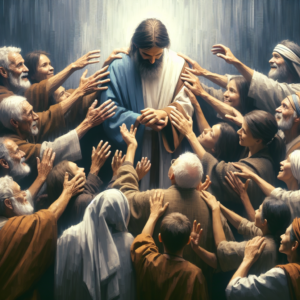The Whale Within: Discovering Redemption and Grace Through Biblical Principles
In the movie The Whale (2022), we are invited into the life of a reclusive English teacher named Charlie, whose struggle with self-worth, redemption, and grace mirrors timeless biblical themes. Just as Charlie searches for meaning in a sea of personal challenges, we, too, are on a journey searching for grace and redemption in our own lives. Let’s dive into how the narrative and characters of The Whale can illuminate our understanding of biblical principles and inspire us to embrace grace, forgiveness, and transformation.
The Depths of Redemption: From Jonah to Charlie
One of the most powerful biblical stories of redemption is Jonah’s journey in the belly of a whale. Jonah’s story teaches us about disobedience, repentance, and God’s boundless grace.
-
Self-Reflection and Repentance: Jonah’s time inside the whale forced him to reflect on his actions and seek repentance. Similarly, Charlie’s isolation pushes him to confront his past and understand his failings. The journey of self-reflection is crucial for both Jonah and Charlie, and it’s an essential step in our spiritual walk as well. Consider Romans 3:23-24, which reminds us, "for all have sinned and fall short of the glory of God, and all are justified freely by his grace through the redemption that came by Christ Jesus."
-
Embracing God’s Mercy: When Jonah repents, God in His mercy spares him and gives him a second chance. Charlie’s journey reflects the struggle for self-acceptance and the longing for redemption, highlighting how God’s mercy is always available to us. In Ephesians 2:4-5, we read, “But because of his great love for us, God, who is rich in mercy, made us alive with Christ even when we were dead in transgressions—it is by grace you have been saved.”
Reflect on a time when you experienced something resembling Jonah’s or Charlie’s journey. How did it help you understand and embrace God’s mercy and redemption?
The Power of Forgiveness: Reconciliation and New Beginnings
Forgiveness is a central theme in The Whale, echoing the biblical call to cultivate reconciliation and pursue new beginnings. It is a vital component of our spiritual growth and our relationships with others.
-
Forgiveness as Freedom: In the Bible, we see the importance of forgiveness, such as when Joseph forgives his brothers (Genesis 50:20-21). This act not only reconciles a broken family but also sets Joseph and his brothers free from the chains of grudges and past hurts. In The Whale, Charlie’s quest for reconciliation with his estranged daughter speaks to how forgiveness can bring healing and transformation.
-
Releasing Past Burdens: Unforgiveness holds us back, preventing us from experiencing the fullness of life. Matthew 6:14-15 teaches us, "For if you forgive other people when they sin against you, your heavenly Father will also forgive you. But if you do not forgive others their sins, your Father will not forgive your sins." The themes in The Whale remind us that forgiveness allows us to let go of past burdens and embrace renewal.
Think about a person in your life you need to forgive. How can releasing that burden transform your heart and relationships for the better?
Grace Unfathomable: God’s Love and Acceptance
Grace is a gift we do not deserve yet receive abundantly through the love of Christ. Just as the themes of The Whale reveal moments of grace among its characters, we too can embrace the richness of God’s grace in our lives.
-
Unconditional Love: One of the most encouraging aspects of God’s grace is His unconditional love for us. Romans 8:38-39 beautifully captures this: “For I am convinced that neither death nor life, neither angels nor demons, neither the present nor the future, nor any powers, neither height nor depth, nor anything else in all creation, will be able to separate us from the love of God that is in Christ Jesus our Lord.”
-
Acceptance as We Are: In The Whale, Charlie is challenged to accept himself despite his imperfections. This mirrors the message of grace: God accepts us as we are, despite our flaws. Titus 2:11 reminds us, "For the grace of God has appeared that offers salvation to all people."
When have you felt God’s grace in your life? How can reflecting on this experience deepen your understanding of God’s acceptance and love?
Call to Action: Dive Deeper into Redemption and Grace
The message of The Whale resonates with the core biblical principles of redemption, forgiveness, and grace. As we journey through life, let us recount the stories of Jonah, Joseph, and others who exemplify these themes, allowing these narratives to inspire change within our own hearts.
Take a moment to share your thoughts or experiences in the comments below. How have redemption, forgiveness, or grace manifested in your life, and how can you embrace these principles more deeply in your daily walk?
Remember to serve as a vessel of grace and forgiveness, just as God has graciously bestowed upon us.
For further inspiration, explore accompanying Bible studies, immerse yourself in stories of transformation, and seek community where you can discuss and grow in these themes. Share this devotional with friends and family, inviting them to contemplate the rich tapestry of redemption and grace woven throughout our lives and biblical narrative.
By embracing these truths from Scripture and stories like The Whale, we can ignite a passion for living in God’s grace and allow our lives to shine as testimony to His transformative love.
If you want to see how ANY movie relates to Biblical principles, please try our Movies and Scripture GPT. Simply key in any movie and let it show you insights you might not have realized otherwise!


